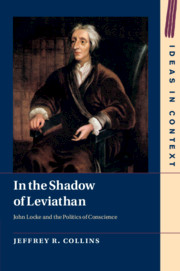Book contents
- In the Shadow of Leviathan
- Ideas in Context
- In the Shadow of Leviathan
- Copyright page
- Dedication
- Contents
- Acknowledgements
- Note on the Text
- Abbreviations
- Introduction
- Chapter 1 John Locke and Interregnum Hobbism
- Chapter 2 The Restoration Projects of Thomas Hobbes
- Chapter 3 Locke and the Restoration Politique
- Chapter 4 Non-domination Liberty in Spiritual Context
- Chapter 5 Locke, Conscience, and the Libertas Ecclesiae
- Chapter 6 Locke and Catholicism
- Chapter 7 Locke and a ‘More Liberal’ Hobbism
- Conclusion
- Bibliography
- Index
- Ideas In Context
Chapter 2 - The Restoration Projects of Thomas Hobbes
Published online by Cambridge University Press: 07 February 2020
- In the Shadow of Leviathan
- Ideas in Context
- In the Shadow of Leviathan
- Copyright page
- Dedication
- Contents
- Acknowledgements
- Note on the Text
- Abbreviations
- Introduction
- Chapter 1 John Locke and Interregnum Hobbism
- Chapter 2 The Restoration Projects of Thomas Hobbes
- Chapter 3 Locke and the Restoration Politique
- Chapter 4 Non-domination Liberty in Spiritual Context
- Chapter 5 Locke, Conscience, and the Libertas Ecclesiae
- Chapter 6 Locke and Catholicism
- Chapter 7 Locke and a ‘More Liberal’ Hobbism
- Conclusion
- Bibliography
- Index
- Ideas In Context
Summary
Chapter 2 attends to the latter decades of Thomas Hobbes’s life and the writing he produced during those years. These writings, concentrated in the later 1660s and early 1670s, responded to a revolution at the royal court and a crisis in Charles II’s relations with the established church. Concerned chiefly with the history of heresy, these writings are often presented as defensive in nature. This chapter reveals them to be assertive efforts to recalibrate and repackage Hobbes’s religio-political project. Confirming the widespread contemporary association of Hobbism with politique toleration, Hobbes’s later writings rallied against confessionalism and the enforcement of orthodoxy and recommended a reformulated and minimal set of Christian fundamentals. The chapter concludes that Hobbes’s previous deference to conscience and ecclesial voluntarism (or Independency) was recast as a narrower freedom of philosophy
- Type
- Chapter
- Information
- In the Shadow of LeviathanJohn Locke and the Politics of Conscience, pp. 63 - 115Publisher: Cambridge University PressPrint publication year: 2020

